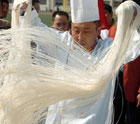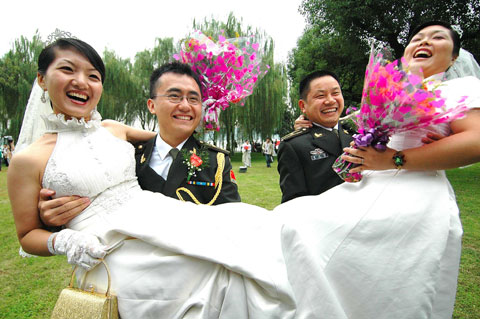Chunshuyuan, in downtown Beijing, is a "green community" boasting not only trees and meadows but also eco-friendly facilities.
The latest community activity is "Green Commute Day", when residents are urged to leave their private cars at home and get to work by foot, bike, bus or subway on the 30th of every month.
"It is the duty of every citizen to do something to make the air cleaner in Beijing," said Li Xiumei, an active participant in the community's green programs.
About 3 km from Chunshuyuan, the Great Hall of the People is red with flags and ribbons, the classic color of the Party Congress, and the leaders of China are doing lots of "green" talking like Li.
"(We will) promote a conservation culture by forming an energy and resource-efficient and environment-friendly structures for industries, the pattern of growth and the mode of consumption," Hu Jintao said in his keynote speech on Monday at the 17th National Congress of the Communist Party of China (CPC).
In response the term, "conservation culture," hit the headlines of all Chinese media on Tuesday.
Elaborating on his Scientific Outlook on Development, the highlight of his speech, Hu said comprehensive, balanced and sustainable development is a "basic requirement".
"The concept of conservation culture puts environmental protection in an ethical and theoretical range instead of just an issue of practice," said Wang Weiping, guest professor at the School of Environment and Natural Resources of Renmin University of China.
Hu's speech has given environmentalists like Wang, who has long lobbied the government for better recycling facilities, a sense of optimism.
"I hoped the guidelines from the leadership will benefit our system of development, for instance, speeding up the making of environmental laws," he said.
Li is no expert in politics or the environment. As a retired worker and housewife, she just looks forward to being able to breath clean air.
"More of my neighbors may take part in protecting the environment if the government is more active, I think," she said.
Green issues are hot in China. Film stars have been invited by TV channels to promote the use of cotton shopping bags rather than plastic ones and every time the State Environmental Protection Administration (SEPA) takes action against polluting industries it is featured on the front pages of newspapers.
Partly, this is because the country is facing a worsening environment. This summer, Taihu Lake, located in China's most energetic economic belt, suffered a serious blue-green algae outbreak, threatening the water supply of more than 1 million residents in the lakeside city of Wuxi, a typical example of how rapid economic growth has worn out the environment.
"It is absolutely the right thing to do (to stress eco-friendly and sustainable development in the keynote speech)," said Khalid Malik, Resident Representative of the United Nations Development Program (UNDP) in China. "But even more important is how to make it operational."
The UNDP is willing to work with the government to explore how to put the guidelines into practice, he said.
The government has made great efforts to solve environmental issues and curb pollution, but several challenges still lie ahead such as transforming inefficient and polluting industries, he said.
"China has not developed a mechanism to ensure polluters pay," he said. "Simply fining them will not work."
Pan Yue, deputy minister of SEPA, has a similar perspective. He recently admitted in an essay that the existing administrative measures against polluters will not be effective in the long term.
Pan called for "green" economic policies including new taxes, charges for polluters, subsidies to those who give up profits for the sake of the environment and preferential financing policies for eco-friendly industries.
"China is in even more urgent need of adopting green economic policies than developed countries," he said.
Xinhua
(China Daily 10/18/2007 page7)











